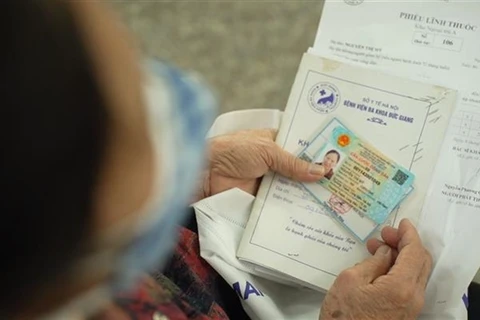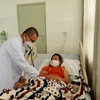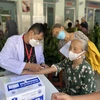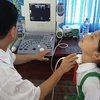Hanoi (VNS/VNA) - Vietnamese people are set to use their chip-based ID cards and national e-identification app for medical checks by 2030, according to a document issued by the Ministry of Health (MoH) on June 13.
The ministry’s Decision No 2491/QD-BYT, which details key missions for digital transformation in the health sector during the 2023-25 period, also aims to connect the databases among all medical facilities, as well as of Vietnam Social Security.
These include birth and death certificates for essential administrative procedures, reviewed vaccination data for management, and health check records for the re-issuance of driver’s licences.
Public health facilities will also need to digitalise information on their personnel, facilities, pharmacies, hospital beds and medical equipment.
Hospitals of level 2 (provincial and municipal) are also expected to accept cashless payment methods, according to the document.
The document also plans to connect the MoH’s database and the National Database on Population to handle administrative procedures.
This means digitalising dossiers and reviewing the procedures related to online public services in order to facilitate the processes for citizens and businesses.
The digital transformation project also set the goal to complete the upgrade of the health ministry’s data centre on the basis of the existing infrastructure.
Cyber security is also a focus of the MoH’s data system and will be periodically reviewed, as per regulations.
Information on monitoring data security will also be shared between the MoH’s data centre, the National Cyber Security Centre, and the Ministry of Information and Communications.
A support network in case of cyber security incidents will also be completed to promptly address the issues that pose a threat to the health sector’s data systems./.
The ministry’s Decision No 2491/QD-BYT, which details key missions for digital transformation in the health sector during the 2023-25 period, also aims to connect the databases among all medical facilities, as well as of Vietnam Social Security.
These include birth and death certificates for essential administrative procedures, reviewed vaccination data for management, and health check records for the re-issuance of driver’s licences.
Public health facilities will also need to digitalise information on their personnel, facilities, pharmacies, hospital beds and medical equipment.
Hospitals of level 2 (provincial and municipal) are also expected to accept cashless payment methods, according to the document.
The document also plans to connect the MoH’s database and the National Database on Population to handle administrative procedures.
This means digitalising dossiers and reviewing the procedures related to online public services in order to facilitate the processes for citizens and businesses.
The digital transformation project also set the goal to complete the upgrade of the health ministry’s data centre on the basis of the existing infrastructure.
Cyber security is also a focus of the MoH’s data system and will be periodically reviewed, as per regulations.
Information on monitoring data security will also be shared between the MoH’s data centre, the National Cyber Security Centre, and the Ministry of Information and Communications.
A support network in case of cyber security incidents will also be completed to promptly address the issues that pose a threat to the health sector’s data systems./.
VNA






















